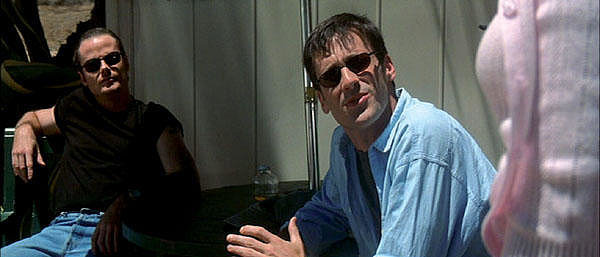Transcript
DAVID GREENE, HOST:
Ten years ago this Sunday, members of the Duke University lacrosse team held an off-campus party. Two strippers were hired – one of them, a young black woman who went to the police.
(SOUNDBITE OF DOCUMENTARY, “FANTASTIC LIES”)
UNIDENTIFIED MAN: She’s asked, you know – have you been the victim of a sexual assault? She said yes.
GREENE: What unfolded was a story that captivated the nation. The narrative – wealthy, white university athletes had taken advantage of an underprivileged African-American woman. It made many people sick.
(SOUNDBITE OF FILM, “FANTASTIC LIES”)
UNIDENTIFIED WOMAN: I’m shocked and appalled that there are still varsity letters on these athletes.
UNIDENTIFIED MAN: Three weeks after a woman accused several Duke lacrosse players of rape and sexual assault, head coach Mike Pressler has resigned. Also, the rest of the lacrosse season was canceled.
GREENE: Ultimately, three players were charged with rape by District Attorney Mike Nifong who quickly became a big part of the story himself. He did dozens of interviews talking about the case and the athletes’ behavior at a time when he was running for office. He won the election, and he kept his job. This whole story is laid out in the documentary “Fantastic Lies” that’s airing this Sunday on ESPN. The director is Marina Zenovich.
MARINA ZENOVICH: It was just a – you know, a perfect storm of everyone overreacting and kind of journalists taking the lead of the DA who was going on television and basically acting as if he had some smoking gun.
GREENE: But there was no smoking gun. In fact, there was no evidence, DNA or otherwise, that a crime had happened at all. It took more than a year for the three players to clear their names, including Duke’s captain David Evans.
(SOUNDBITE OF DOCUMENTARY, “FANTASTIC LIES”)
DAVID EVANS: I am innocent. Reade Seligmann is innocent. Collin Finnerty is innocent. Every member of the Duke University lacrosse team is innocent. You have all been told some fantastic lies.
ROY COOPER: Today, we are filing notices of dismissal for all charges against Reade Seligmann, Collin Finnerty and David Evans.
GREENE: Marina Zenovich came into our studios to talk about this ESPN “30 for 30” documentary. And I began by asking her whether people just had this perception that lacrosse players at a big-time university represent a kind of white privilege.
ZENOVICH: I think it’s unfair, but people are going to react the way they want to react. I found it fascinating, as a filmmaker, how people had so much judgment, whether they were right or wrong.
GREENE: Was it hard to get people to talk?
ZENOVICH: Oh, my God. Are you kidding? I literally would just start writing letters almost as a joke to see how many noes I could get. I have a whole file of noes, and it was just one after another.
GREENE: You got some of the players on the team to talk, but none of the three who were actually charged.
ZENOVICH: Right.
GREENE: What did they tell you? Or what was their response to you?
ZENOVICH: Do you know that I’ve never spoken to any of them? I fight and fight to get people to talk, but I never reached out to them myself. They knew the film was happening. They knew that I was trying to get them through their lawyers, through their parents. But on some level, I really respected the fact that they just want to move on. It’s unfortunate that they will be labeled as the Duke lacrosse boys, but unfortunately, that’s what happens.
GREENE: I want to play one clip from one of the professors who spoke to you, James Coleman, a criminal law professor at Duke. Let’s just listen to a little bit of this.
(SOUNDBITE OF DOCUMENTARY, “FANTASTIC LIES”)
JAMES COLEMAN: People, you know, treated it like a Christmas tree and they put their lights on it and their ornaments to, you now, push other issues that they could connect to it. But this was the wrong case for that. It doesn’t support all of these other issues I – that people want to sort of, you know, heap up on it and use it as a platform.
GREENE: Say more about the Christmas tree metaphor and what you make of that.
ZENOVICH: Well, everybody brought to this case what they wanted to bring to it, and that’s, I think, a big problem with cases like these. Everyone is coming from their own experience. And I was glad that professor Coleman kind of could explain that because he was in the thick of it.
GREENE: Whose job was it to stop that from happening – to tell people to pause and wait for the truth?
ZENOVICH: Well, I think it’s our elected officials’ – the DA in the case. I mean, you know, everyone looks to the DNA for the truth, you know. But this is a case where he was engaging in serious professional misconduct and was disbarred.
GREENE: I want to play one more clip of tape from the film. It’s – you spoke to Dan Okrent who is the former public editor from The New York Times. And here’s what he had to say.
(SOUNDBITE OF DOCUMENTARY, “FANTASTIC LIES”)
DAN OKRENT: It was male over female. It was rich over poor. It was educated over uneducated. My God, all the things that we know happen in the world coming together in one place And you know, journalists – they start to quiver with a thrill when something like this happens.
GREENE: You do sort of paint a picture of journalists as real – as really failing here.
ZENOVICH: You know, it started as a sports story, and it became bigger and bigger. And, as I said, it had a DA who was – you know, didn’t go on one local radio show. He went on national talk shows acting as if the boys were already guilty. I mean, this all played into this mishandling of this case.
GREENE: There was something about, you know, three white men – you know, that the truth being discovered and not being – not having to serve time for a crime they didn’t commit. And I just think about, you know, the Innocence Project, which these young men have joined, which is to get wrongly accused people, you know, out of prison. And, you know, I just think about the number of young black men around this country who are serving time in prison for crimes they didn’t commit. Did that sort of thing come to mind as you were putting this documentary together?
ZENOVICH: You know, it did. But what also came to mind is that this film focuses on a case where men were falsely accused and where a DA engaged in serious professional misconduct. But this should not, in any way, detract from the fact that the vast majority of reports of sexual assault are true. And to use this case, the Duke Lacrosse case, as representative of a wider issue would be a profound injustice to the real victims who have the courage to come forward.
GREENE: That was the director Marina Zenovich. Her documentary “Fantastic Lies” airs on ESPN this Sunday night.
Copyright © 2016 NPR. All rights reserved. Visit our website terms of use and permissions pages at www.npr.org for further information.
NPR transcripts are created on a rush deadline by a contractor for NPR, and accuracy and availability may vary. This text may not be in its final form and may be updated or revised in the future. Please be aware that the authoritative record of NPR’s programming is the audio.





